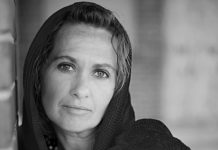Looking back, I realize how the ferocious world beneath the heavens is tamed, at crucial moments, through communication on that biblical Ladder of Jacob.
Perhaps the world, as described by a poem written by Nichita Stănescu, would have looked ferocious to me if I hadn’t had the privilege to meet certain people who would encourage me, guide me, and give me confidence when I most needed it.
The first person who showed me that the world of education and learning is not ferocious, and who drove away my terrible fear of not meeting its requirements, was my teacher, Ms. Maria Ristea. I was totally discouraged, shy, and frightened by the novelty that school was going to bring into my life, and I did not share my fears with anyone.
I think that the insecurity about my abilities, which silently accompanied me all my life, would have invalidated me for any performance had it not been for the teacher who first made a difference, surprising me with praise and first prize.
Another person who appeared at the right time was Professor Constantin Aslam who guided me in choosing which university faculty to study in. During the old regime, the opportunities to study what suited you were limited, and I had reluctantly tried to enter the Law Faculty and failed, in a competition where twenty people competed for one spot, because I could not memorize the admission handbooks. Although I wasn’t drawn to a legal career, this failure seemed like a dead end. I had disappointed our family and our small town, where everyone knew everyone.
The atmosphere of those provincial towns had something oppressive, like the smouldering, puny, unknown dramas of Chekhov’s characters. I then received a bright and comforting signal from the Romanian language teacher, Emil Mușat, who sent me a tape with soothing music for the soul. Professor Aslam, however, with whom I spent two hours during private philosophy lessons, and another two or three discussing concepts beyond the textbook materials, told my mother that I “emanated spirituality”.
These words scared me a little because they increased the responsibility placed on my weak shoulders to prove myself. The 1989 revolution came in time though, and Mr. Aslam’s words gave me enough momentum to apply to the Faculty of Philosophy, where memorizing the subject was not required, just reasoning. I got in tenth, with the highest mark in the philosophy test, in a competition where twenty-two people were competing against each other for one spot.
At the end of my undergraduate studies, which I appreciated, and which stimulated me to develop intellectually (less spiritually), my mother, Elena Matei, played a decisive role in helping me choose to further my university career. I was quite confused, and that old shadow of insecurity and mistrust of myself, was circling me once again. My mother told me that, given the vast experience she had in the department, she could see that I too had skills for this.
I chose to believe her, who was a teacher by calling, to remove the fog hanging over my future.
Then came the providential proposal of professor and academician Ion Ianoși, who had coordinated and appreciated my master’s thesis, to start a PhD, also under his guidance. The path of my university career had begun to take shape.
Then, at the age of thirty, the one who had been my moral support and mentor for seven years of loneliness, after the divorce that thrust me back into a ferocious world, was Ms. Stella Petecel. Surprisingly, even though she had been my ex-husband’s ancient Greek teacher in college, she “chose” me, told me she wanted to support me morally, and that’s what she did.
With delicacy, with an out-of-this-world serenity, with a radiant emotional warmth, always put in elegant, well-aimed formulas, which comforted and spared at the same time, she was like an angel who granted me her friendship, while receiving my earthly visits. Time passed differently in her presence. It seemed not to go by, but resembled a liquid, spiritualized by her exceptional speech, floating generously among us.
She inspired lucidity and, at the same time, detachment and elevation, ennobling reality. She told me twice, once at the beginning and once at the end of those seven years, that she was convinced that I would meet the right person to fulfil me and that, as people say, “what was mine was set aside”. The first time I was amused by this “prophetic” formula, then I looked at it with suspicion for years and years, in a ferocious world through its precariousness.
The only happily married people I had ever met were my grandparents, Ion and Eleonora Oprea. They were the “exception to the rule” of marital failure. I later realized that the secret of their happiness was that they had given God first place in their lives; they had allowed themselves to be shaped by Him and thus harmonized with each other, although initially, with a wedding arranged by their parents, this had not been the case at all.
Through their relationship model, they helped me on my way to maturity, long after they were gone, showing me that marital happiness is not a fairy tale, that if it was possible in at least one case, then it was not an existential impossibility.
However, that generous and spiritualised time, which had soothed my soul in the presence of my teacher, led to her “prophecy” being fulfilled, a few years after she passed away. I met Dumitru Borţun, who became my husband, colleague, friend, confidant, comrade, collaborator in many beautiful projects, brother of faith, the one with whom I feel that together we can aspire to the most important identity and destination, without which the rest is meaningless: that of children of God.
He is the one who confirmed, through his unique, bright, comprehensive personality, that happiness in marriage is possible, that you can discover an alter ego in your partner, that you can communicate so well and share everything with him. He is the one for whom I prayed to God according to a radical formula: “Lord, if You want to place a suitable man in my path, then help us both to grow in faith, to draw close to You always, and to have mutual love, respect, admiration, and support, to live in harmony and balance. If this is not possible, then help me to bear the great Nothing, give me the strength to carry on”.
Looking back, I realize how the ferocious world beneath the heavens is tamed, at crucial moments, through communication on that biblical Ladder of Jacob. Through the higher beings of heaven, sent by God to work through men, to imprint on us, as much as we can bear, the fragrance of Heaven. It is up to us to accept it and increase it by sharing it, to hold on to it until it becomes the strongest support for life here on earth. “An aroma that brings life”—this is what the providential people we meet tell us (2 Corinthians 2:16).
Corina Matei (51 years old) is a university lecturer, PhD at the “Titu Maiorescu” University of Bucharest. She has a bachelor’s, master’s and PhD degree with the Cum Laude distinction at the University of Bucharest, the Faculty of Philosophy, and her concerns and works focus on communication, ethics, critical thinking.




















